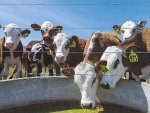Nathan Back, DairyVets says the new ‘Pacifica’ strain of the bacterial disease has recently become more common in NZ. A new cattle vaccine, Lepto 4-Way, has been developed to provide an immune response against this strain and is being recommended by Back.
Back says the decision to switch leptospirosis vaccines is to better manage the risk that leptospirosis is now presenting on farms and within the local community.
“This is particularly important for people working within our practice and farms – farmers, farm workers, vets and technicians.
“To reduce this risk, we feel that all animals on farms – cows, pregnant heifers, calves and other stock – should be vaccinated with Lepto 4-Way for the coming season and this is the vaccine we will be using.”
Leptospirosis is caused by a bacteria that are spread from animal to human. Lepto is contracted most commonly through exposure to the urine of infected animals, either through direct contact or via contaminated water. The bacteria enter through cuts or grazes on the skin, or through the mucous membranes of eyes, nose and mouth.
Matt Wells, technical veterinarian at Virbac NZ, the registerer and distributor of Lepto 4-Way, says that in recent years New Zealand has seen an increase in cases of lepto in farmers and staff working on vaccinated farms, many of which are thought to be due to the new Pacifica strain.
Wells says vaccination of the herd is one of the most robust ways to reduce the risk of leptospirosis coming into the herd as well as rodent control, hygiene and personal care when working closely with animals and on farm, and other measures such as the fencing off access to waterways and strict control around effluent spreading.
All animals in the herd will need two doses of the vaccine: an initial dose, then a booster about four to six weeks later. This will include all pregnant cows, pregnant heifers (R2) and all replacement heifer calves, which will provide the necessary immune response against the new strain.
Wells says the impact lepto can have on farm is devastating, with severe flu symptoms in humans and in some cases debilitating illness requiring hospitalisation. A recent survey conducted by Massey University showed that half of those affected were still experiencing symptoms a staggering eight months after diagnosis.
There are different types of lepto, with cows often showing no clinical signs. This means that working with dairy cows can pose a significant risk for contracting lepto, so preventing exposure is vital.
“Since the 1970s we have been fortunate to have highly effective cattle vaccines, which have reduced the rate of human infections dramatically.
“Unfortunately, in recent years we have seen cases of lepto in farmers and staff (including teat sealing technicians) working on vaccinated farms, many of which are thought to be due to the newly discovered strain of lepto within our dairy herds. This new strain, known as Pacifica, wasn’t covered by the traditional dairy cattle lepto vaccines. Recent research suggests Pacifica could be present in almost three quarters of dairy herds throughout New Zealand.
“The new cattle vaccine, Lepto 4-Way, has recently been developed to provide an immune response against the emergence of Pacifica as well as the 3 strains (Hardjo, Pomona & Copenhageni) previously covered by the traditional vaccines. Sharing a similar mindset to Nathan at DairyVets, farmers and vets throughout the country have been choosing to switch or upgrade their lepto vaccine and vaccinate their cattle with Lepto 4-Way since it became available early February,” Wells says.



















